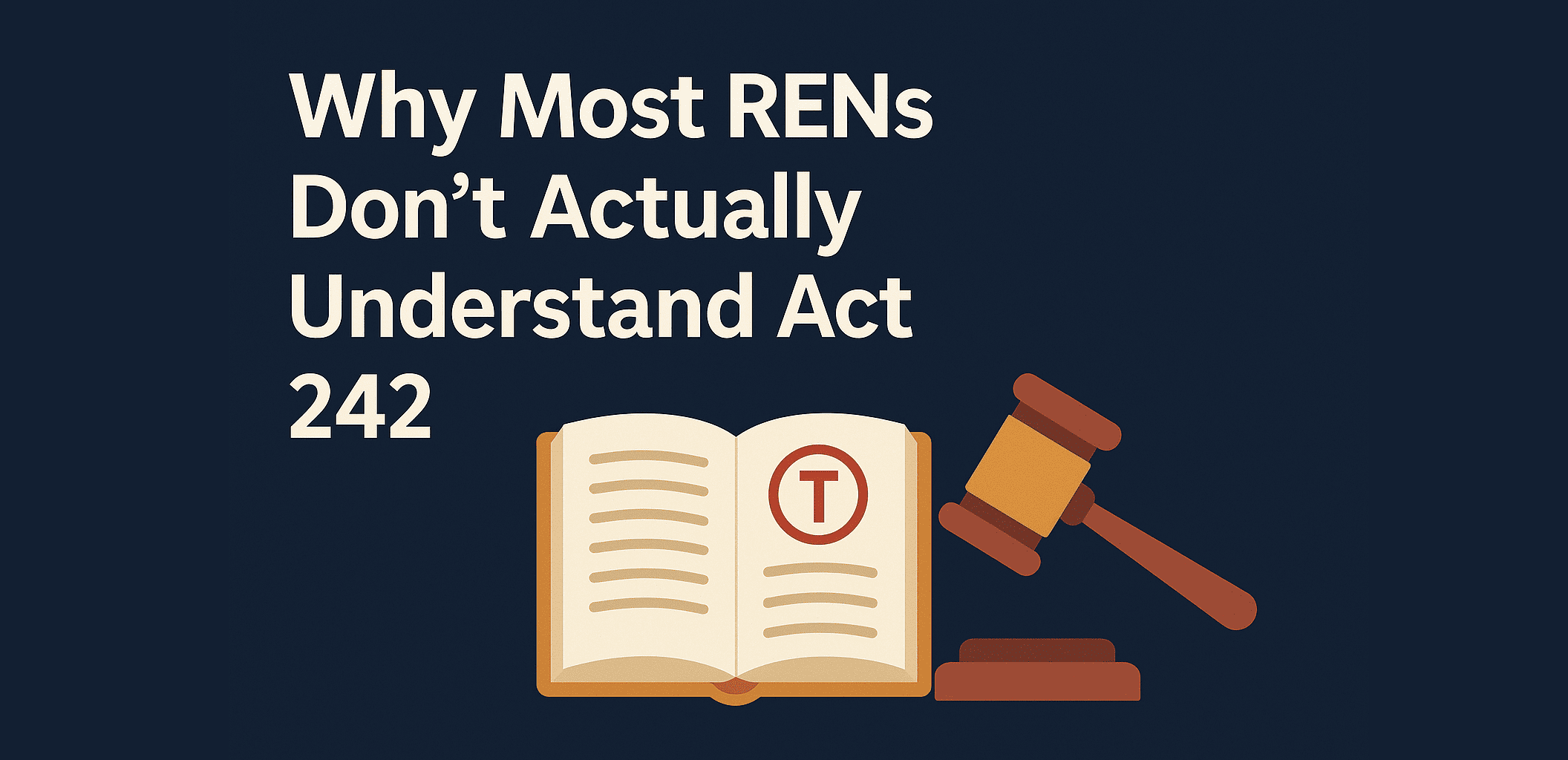Why Most RENs Don’t Actually Understand Act 242

A REN collects a deposit into their personal account to “speed things up.”
A Facebook ad runs without a license number.
A casual promise about future development becomes a lawsuit.
These aren’t just mistakes — they are breaches of Act 242 that most RENs are never properly taught to avoid.
In Malaysia’s property industry, Act 242 — the Valuers, Appraisers, Estate Agents and Property Managers Act 1981 — is the backbone of regulation. Every licensed REA knows it well. They had to: studying for years, compiling log books, and sitting through oral interviews with the Board before qualifying.
But RENs? They take a short, two–four day course, get a REN tag, and then enter the market. Most only hear Act 242 mentioned in passing, and almost none study it in depth. The result is predictable: RENs break rules they don’t even know exist, leaving themselves and their principals exposed.
1. REA vs REN: A Fundamental Divide
- REA (Registered Estate Agent): Licensed professionals who carry personal liability under Act 242. They are trained, examined, and closely supervised by the Board of Valuers, Appraisers, Estate Agents and Property Managers (BOVAEP).
- REN (Real Estate Negotiator): Salespersons registered under an REA. They hold no licence themselves. Their authority is delegated, and their compliance is the responsibility of their supervising REA.
The law is clear: RENs must operate under the direction and supervision of REAs.
2. The Supervision Gap in Practice
On paper, REAs are expected to oversee daily operations closely. In practice, however:
- Many agencies grow quickly, and RENs end up managing most sales activity.
- REAs may focus on strategic matters, while day-to-day decisions are left to RENs.
- RENs often make operational calls without fully grasping the legal implications under Act 242.
Only when disputes arise — deposits gone missing, commission fights, BOVAEP complaints — do REAs get consulted.
3. REN Blind Spots in Act 242
Because RENs have only a crash-course introduction, their understanding is shallow:
- Deposits: Many think it’s fine to collect using personal accounts. Act 242 requires use of the firm’s client account.
- Advertising: RENs often run Facebook ads or post on portals without including their REN number, agency name, or REA licence details. Breach.
- Authority: RENs mistakenly believe they can act independently. In truth, every REN operates strictly under their agency’s and REA’s authority.
- Scope: Some assume they can freelance or co-broke freely. Act 242 requires all work to be tied to their supervising REA.
4. Why This Becomes Dangerous
When a REN makes a mistake, it isn’t just their problem. Act 242 places liability squarely on the REA. So if a REN misuses funds, misrepresents property details, or breaches PDPA, the REA’s licence is at risk of suspension or revocation.
This creates a dangerous imbalance:
- REN drives the daily operations (but with limited legal training).
- REA bears the liability (even if not involved in the decision).
5. The Business Reality
In today’s market, many agencies operate with RENs running much of the sales front, while REAs focus more on compliance and governance. While this division looks workable, problems emerge when RENs act outside their depth of knowledge and expose the agency to legal risk.
6. What Needs to Change
For the industry to remain sustainable, RENs must stop treating Act 242 as a footnote and start respecting the framework that keeps the profession credible. That means:
- Closer supervision — REAs must stay actively involved in day-to-day oversight.
- Deeper REN education — short courses are not enough; RENs need continuous compliance training.
- Clearer role separation — RENs handle sales, but governance and compliance must remain with REAs.
- Compliance as culture — don’t wait for complaints or audits; build compliance into daily workflows.
Final Word: Shared Responsibility, Different Roles
Act 242 isn’t “just for REAs.” It governs the entire profession. But because RENs are undertrained and often unsupervised, most don’t actually understand it — and agencies are left exposed.
The strongest firms are those where REAs remain actively engaged, ensuring compliance and guiding their teams. And RENs who want a lasting career? They go beyond memorising rules; they learn Act 242 properly, so they don’t run businesses built on shortcuts that could one day collapse.











































































































